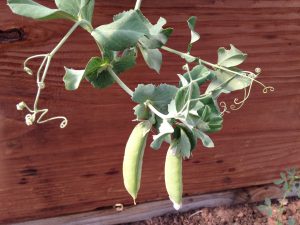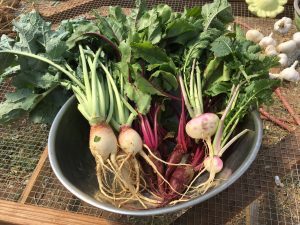Veggies to Plant Now for Fall Harvest
As we begin to reap the major bounty of our spring/summer planting, many of us are busy with food preservation including canning, freezing, and drying. We’re also cooking up a lot of our veggies to enjoy now. If you’re up for it, there is one more task!
It’s time to plan and start a fall garden. Seed for Peas, fava beans, carrots, parsnips, beets, chard, cabbage, spinach, broccoli, kale, turnips, rutabagas, radishes, and kohlrabi can all go in the ground from mid-July to mid-August. All these veggies will withstand cooler temperatures. Those growing above ground can take a light frost and even some snow. Root vegetables can stay underground with a cover of heavy mulch and be harvested as needed.
If you’ll be growing in a plot where you have recently harvested, the soil should already be nicely loosed up. If your soil has not grown plants recently or has become compacted, you can loosen it up with a broad fork or vegetable fork (like you use for harvesting potatoes). Remove any weeds that may have sprouted. Add a bit of peat moss or some well composted manure or composted wood chips, or some homemade compost to your plot. All composted materials should be composted for at least 90 days to destroy any harmful bacteria and to keep them from stealing nitrogen from your plants.
Plant your seed in rows or grids, allowing room for plants to mature.
Keep plot evenly moist until seedlings sprout and get at least 2″ tall. Then, as long as temperatures are high, water as you normally would for spring/summer grown plants. As weather cools, you can cut back on water, but be sure that the ground does not dry out. Apply a medium-to-heavy mulch of composted leaves or composted wood chips.
If aphids attack your plants, you can give them a hard spray of water to knock them off. A mixture of water and a mild soap (like ivory) sprayed on both sides of the leaves and stems can also be quite effective.
If you have a problem with bindweed (and who doesn’t!), you can get bindweed infected with a gall mite at the Palisade Insectary. The mites stay on the plants year round and have multiple generations each year.
Palisade Insectary
750 37.8 Rd.
Palisade, CO 81526
(970) 464-7916
insectary@state.co.us
Enjoy your fall bounty!
Annie Hughes’ articles can be found at www.redwingranchco.com.
 Red Wing Ranch
Red Wing Ranch


Recent Comments